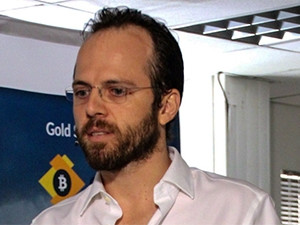
A web of lies and deceit and a bizarre attempt to hire a hit man - as well as a new world of 'frictionless money' where paying someone online is easier than sending an e-mail - were all spoken about at a fintech conference in Johannesburg yesterday.
This was the Blockchain and Bitcoin Africa Conference 2016, where industry CEOs, engineers, entrepreneurs, and even a US federal prosecutor, gathered at The Core in Johannesburg to discuss the future of the cryptocurrency.
And the hit contract? William Frentzen, a federal prosecutor from the US Attorney's office, told those attending the incredible story of how they caught Ross Ulbricht (also known as Dread Pirate Roberts), the boss of Silk Road, which was best known for selling illegal drugs using Bitcoin. Roberts also attempted to arrange a number of murders-for-hire when relationships with associates and others turned sour.
Frentzen told how, in the process, they had also nabbed two other federal agents who were stealing Bitcoins hand over fist for themselves. The agent, Carl Force, perhaps with an eye to posterity, admitted later he had entered into a $240 000 contract with 20th Century Fox related to a film concerning the government's investigation into Silk Road.
The Silk Road case did considerable damage to reputation of Bitcoin, but according to Ian Merrington, CEO of the Cape Innovation Technology Initiative, that narrative how now changed.
He told ITWeb: "A year-and-a-half ago it was all about Silk Road and money laundering. Now, the words I see used a lot are provenance, trust and transparency."
Bank appeal
Merrington said at the 2015 Bitcoin conference, people had turned up to find out about the cryptocurrency - a kind of peer-to-peer system which allows participants to make instant anonymous transactions. The 'blockchain', on the other hand, is the public record of every single Bitcoin transaction.
He said those attending in 2016, however, were now active in the online ecosystem and value chain and were looking for a way to get their products into the mainstream.
Mentioning that this year's conference had in part been sponsored by a bank, he said financial institutions had become very interested in the cryptocurrency.
"The banks know there's this wave of innovation coming, and that their product set is under threat. They're asking themselves 'how do we get into this?'
He said the focus was also turning to how the Bitcoin market was going to be regulated.
"We've got this really cool tech and we've got a very strict regulatory environment which is very rigid. How do we bring these two together?
"Where innovative technology is successful, it's disruptive and inevitably it starts to clash with the regulators. We've seen it with Airbnb all over the world and we've seen it with Uber. And now we're starting to see it with fintech, particularly with cryptocurrency. Does that become a war, or do we look to cooperate?"
Marcus Swanepoel, CEO of BitX - a Bitcoin exchange and wallet provider - wondered in his presentation what the banks of the future were going to look like and what role cryptocurrency was going to play.
Swanepoel, who is based in Singapore, spoke of the concept of "frictionless money".
He said when one looked at communication on the Internet - Skype, or e-mail - it was fast, free, easy to access and easy to use.
"Money, for some reason, doesn't work like that," he said, adding that if he wanted to send money to someone in another country, it was "quite difficult".
Free banking
Swanepoel said he believed banking would become an "instant, free service" and there were a lot of companies - among them PayPal - that were trying to make money "more transparent and a little bit cheaper, a little faster". They were, however, a "drop in the ocean" compared to the broader financial services industry.
Swanepoel said the move to a world of frictionless money would require a paradigm shift, not merely a new business model, and would have to include a global money transfer protocol. Either that, he said, or a global currency. This new system would also be decentralised - just like the Internet.
He said the crossover to a new paradigm would only happen if there was new technology to enable it, much like the move to paper money from gold coins had required a secure mechanism - watermarks and serial numbers - so that the money could not be "faked".
"When you look at the technology breakthroughs we have seen with Bitcoin specifically, or blockchain more broadly, it allows you to transact on a peer-to-peer basis online for the first time. All of a sudden you have enabled the technology that allows the consumer needs to move into that next paradigm.
"Then the idea of a global decentralised cryptocurrency feels more like a natural evolution of money. It doesn't feel like a weird new crazy thing. It's just evolution and we happen to be sitting right in the middle of it."
Swanepoel said the concept of interoperability was a key one, and while there was a worldwide push for more open APIs in the financial sector, the impact had been a marginal one.
Instead, he suggested, the actual currency or payment mechanism itself needed to be open, which led to what he termed "permissionless innovation", and thus "total interoperability".
By way of example, he said his company BitX had launched its Bitcoin wallet about 18 months ago, and already it could be used at over 150 000 merchants all over the globe. He said this merchant base was growing rapidly, and next year "might be a million merchants". Its wallet was also interoperable with another Bitcoin wallet called Coinbase.
"We don't have an agreement with them. We don't need to trust them. People can move money between these two wallets.
"When you start looking at this ecosystem and its interoperability, you can see why this industry is moving so fast and adoption is growing so quickly."
Share